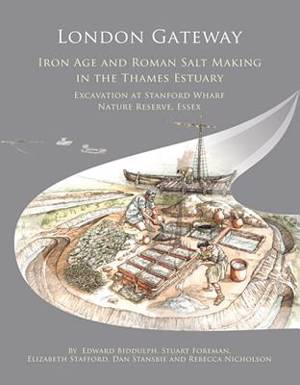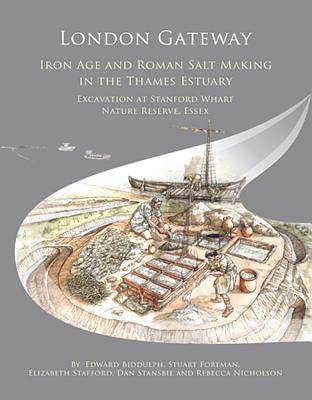
- Retrait gratuit dans votre magasin Club
- 7.000.000 titres dans notre catalogue
- Payer en toute sécurité
- Toujours un magasin près de chez vous
- Retrait gratuit dans votre magasin Club
- 7.000.0000 titres dans notre catalogue
- Payer en toute sécurité
- Toujours un magasin près de chez vous
London Gateway
Iron Age and Roman Salt Making in the Thames Estuary, Excavation at Stanford Wharf Nature Reserve, Essex
33,45 €
+ 66 points
Description
Excavation by Oxford Archaeology in 2009 during construction of the Stanford Wharf Nature Reserve, funded and supported by the developer, DP World London Gateway, uncovered remarkable evidence for Iron Age and Roman-period salt making and associated activities. Structures included a probable boathouse, unique in Roman Britain. The excavations shed new and important light on evolving methods of salt production, which reflect wider changes in economy and society in the Thames Estuary between c. 400 BC and AD 400. Salt had a particular economic importance in the ancient world as a food preservative - changing scale and methods of production provide an essential background for understanding processes such as urbanisation, civilian trade and military supply. Salt also had a wide range of dietary, social and symbolic functions, from flavouring food to forming an ingredient in medicines and religious rituals. In the words of the Roman naturalist Pliny the Elder, writing in the first century AD, 'civilised life cannot proceed without salt'.
This monograph presents the internationally important findings of three years of fieldwork and post-excavation analysis. The large scale of investigation and extensive scientific analysis of the remains has transformed our understanding of the important Iron Age and Roman salt making industry in Essex.
A companion volume on the marine investigations conducted by Wessex Archaeology is presented in: London Gateway: Maritime Archaeology in the Thames Estuary.
This monograph presents the internationally important findings of three years of fieldwork and post-excavation analysis. The large scale of investigation and extensive scientific analysis of the remains has transformed our understanding of the important Iron Age and Roman salt making industry in Essex.
A companion volume on the marine investigations conducted by Wessex Archaeology is presented in: London Gateway: Maritime Archaeology in the Thames Estuary.
Spécifications
Parties prenantes
- Editeur:
Contenu
- Nombre de pages :
- 209
- Langue:
- Anglais
- Collection :
- Tome:
- n° 18
Caractéristiques
- EAN:
- 9780904220711
- Date de parution :
- 31-12-12
- Format:
- Livre relié
- Format numérique:
- Genaaid
- Dimensions :
- 208 mm x 300 mm
- Poids :
- 1156 g

Les avis
Nous publions uniquement les avis qui respectent les conditions requises. Consultez nos conditions pour les avis.





